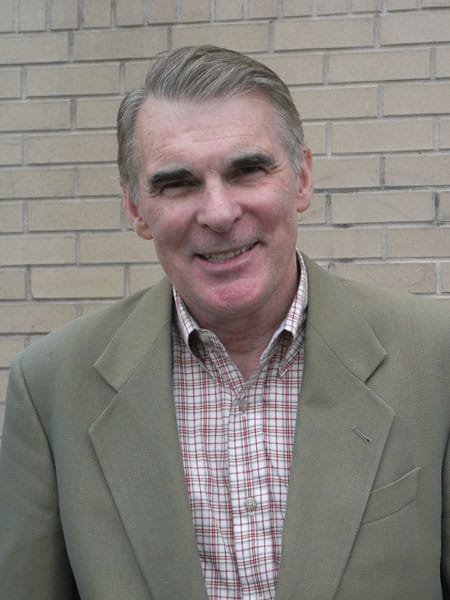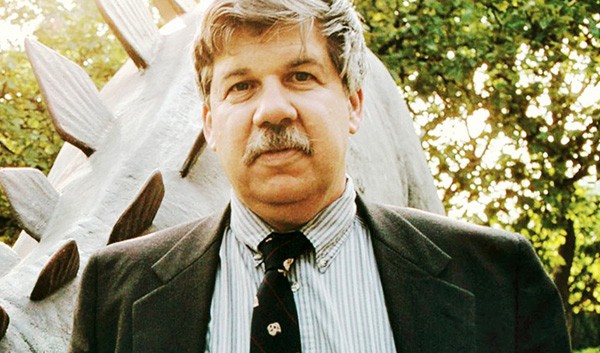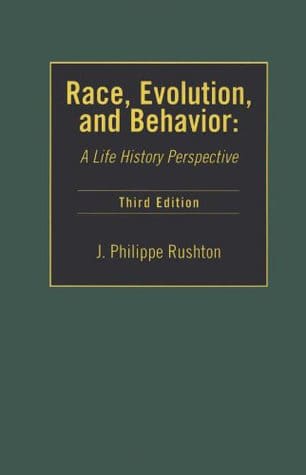Philippe Rushton and the Future of Mankind
Graham Seibert, American Renaissance, February 14, 2020

Philippe Rushton opens his 1995 book Race, Evolution and Behavior by noting that racial differences are more than skin deep. Research by scientists in every discipline — genomics, paleontology, psychology — have confirmed this.
Rushton’s observations remain beyond the pale, and the nations of the West have therefore made catastrophic policy decisions. Because they wrongly ascribed social problems to white racism, they followed supposedly remedial policies that hurt whites. Those policies have been expensive, unfair, and they haven’t worked.
I recently supervised the translation of the abridged version of Rushton’s book into six European languages. This is for the benefit of people in Eastern Europe, who have not yet succumbed multiculturalism, but who also do not see much scientific writing on race. This translation project has renewed my admiration for Philippe Rushton.
Rapid evolution
The human species evolved rapidly. Most notably, the size of our brains almost quadrupled in the 7 million years since we parted company with the chimpanzees. There has been a more than 20-fold acceleration in the rate at which our brains have been growing.
Why did humans come to dominate the earth? Collectively, we weigh more than any mammal species except for cattle — which we breed for our own consumption. Where is evolution headed today? Every breeding group has a strategy for reproduction, and Rushton’s sin was to have analyzed the different strategies of the three major races.
Different populations adapt to their environments. As we spread out of Africa, humans found and mastered a wider range of environments than any mammal species in history. Even more significant, we learned to change our environment. We started by inventing stone tools and learning to make fire. In the 10,000 years since the dawn of agriculture and since we began to civilize ourselves, we have been changing our environment at a great rate. We have been forcing our own evolution.
Rushton limited his analysis to the three most significant races then present in the United States and Canada: Whites, Blacks, and Northeast Asians. He notes the omissions in his book, but noted that three races are enough to make his point.
Rushton’s ordeal
It is Rushton’s 50-page abridgment of the 250-page original that made him a pariah. The scholarly work, with footnotes and a bibliography of a thousand entries, priced at $80, was largely ignored. It was when he mailed thousands of copies of the abridged version to academics that he faced a firestorm. Arthur Jensen’s got the same treatment with “How much can we boost IQ?” in 1969, and Murray and Herrnstein with The Bell Curve in 1994.
Our liberal masters don’t want the public exposed to these facts, and Steven Pinker’s 2002 The Blank Slate provides a good account of the abuse these researchers took. Abuse was effective: Most people who still publish in this field are past retirement age. Many younger ones carefully avoid discussing the implications of their research.
Rushton’s thesis
There are large racial differences in age of maturation, level of crime, and parenting practices. The races also differ in testosterone levels, frequency of sex, brain size, twinning rates, genital size, age of puberty, and infection rates for sexually-transmitted diseases. There is always the same pattern, with Northeast Asians at one end, Africans at the other, and Caucasians in the middle.
Rushton found a consistent correlation for brain size (weight at autopsy, MRI measurement), brain complexity (surface area, gray matter), and intelligence. He found the usual pattern, with Oriental brains averaging 1364 cubic centimeters, blacks with 1267, and whites between the two.
At the heart of the intelligence debate is the century-old “nature/nurture” battle. Nature — heredity — held the upper hand for the first half-century after On the Origin of Species. In the 1930s, it ran into stiff opposition from Franz Boas and his followers who insisted that “culture” or environment explains human differences.
These scientists refused to accept what they called the “genetic determinism” and the eugenics proposed by Darwin’s follower Francis Galton. Politically, the eugenicists were at odds with the American egalitarian notion that any boy could grow up to be president, and were also at odds with the Soviets’ belief that they could create a “New Soviet Man” by adjusting the environment.
“Nurture” took over the media and academia. Scientists themselves, however, remained largely unconvinced. There are few serious books by real scientists that claim human beings are predominantly the product of environment.
Rushton offered a powerful evolutionary explanation for racial differences by applying a concept from the then-new field of sociobiology, founded by Harvard’s E.O. Wilson and including Stephen Pinker, Richard Dawkins, Daniel Dennett and Robert Trivers. Wilson introduced the r-K theory of reproductive strategies of plants and animals, and Rushton applied it to human groups.

J. Philippe Rushton
r strategists reproduce by having large numbers of offspring to which they provide no or minimal paternal care, in the expectation that enough will survive to keep the species going. Rushton’s example for r strategy is the oyster, which spews 500 million fertilized eggs per year into the ocean. A K strategist has few offspring but provides enough care so that most survive to adulthood. Gorillas, for instance, don’t start to reproduce until they are 10 years old and give birth only every five years.
Within all species, many traits co-vary along the r-K axis.
- Length of gestation
- Age of puberty
- Brain size
- Prominence of sexual attributes
- Level of sex hormones
- Level of sexual activity
- Level of care for young
- Incidence of disease (r-strategists have more disease because they are less likely to avoid sexually transmitted and other communicable diseases, do not have good hygiene, and many live in warm climates where there are tropical diseases.)
- Life expectancy
Rushton made a few additions to Wilson’s list for humans:
- Social responsibility
- Sexual restraint
- Marital fidelity
Rushton’s argument is that while all humans are very K-selected, Orientals are the most K-selected and Africans the most r-selected. Life in Africa is easy but unpredictable. It doesn’t take much planning ahead — minimal need for clothing, shelter, or planning for the winter — but tropical diseases and wild animals make it unpredictable. The best strategy? Have a lot of children and don’t worry too much about caring for them.
At the other end, Orientals were hunting large animals in the frozen north. They needed a high level of cooperation, more planning ahead, and more ingenuity for devising clothing and shelter. They could not afford to put a lot of effort into sexual competition. Most of their children survived to adulthood. Europeans’ evolutionary environment was somewhat less harsh, but more Asian than African.
The intellectual climate of Rushton’s time
Rushton’s thesis was in line with the work of other evolutionary psychologists. For example, Robert Trivers published a number of papers in the 1970s on the differing genetic interests of mother, father, child and siblings, and the family dynamics of these conflicting interests.
Sarah Blaffer Hrdy’s Mother Nature is about the evolution of the mother-child bond. It is not as natural as was thought: Humans may reject an infant that is unfit or won’t survive. That is why our children evolved to be fatter than other ape babies, so cuddly — and loud. Her second book, Mothers and Others attributes human evolutionary success to human mothers’ ability to enlist “alloparents” — other female relatives — to help rear children. Hence, the evolution of menopause; older, infertile females take care of grandchildren.
As late as the 1990s, several authors defended the “nurture” explanation of human differences. The most popular was Harvard’s Stephen Jay Gould with his book The Mismeasure of Man. There was intense antipathy between Gould and Wilson, who called Gould an academic fraud. Gould set up straw men, attacking research that was decades old as if it were the latest news. He also — famously — claimed that Samuel George Morton’s skull measurements from the 1830s were falsified. It was Gould’s claims that were false.

Stephen Jay Gould. Wikimedia Commons.
It is interesting to read Gould’s book, as well as Richard Lewontin Not in Our Genes and Ashley Montagu’s Race and IQ. They are at archive.org, and have a strident, polemic quality that is missing from Rushton and the others. Just by their tone they identify themselves as political rather than scientific works. Very few books defending the nurture argument have appeared in the last couple of decades. I reviewed the 2013 Race Decoded — I may be the only person who ever read it. Such people simply have no argument.
Recent works validate Rushton’s thesis
Many recent books describe findings that for Rushton could have been no more than hunches. Robert Plomin’s 2019 Blueprint recaps his career of investigating the importance of heredity over environment. Much more is attributable to heritability than had been thought. In Chapter 3, Prof. Plomin writes: “[M]ost measures of the environment used in psychology show substantial genetic influence. What look like environmental effects . . . are actually genetic effects.” If anything, Rushton was too modest in his claims for genetic influence.
Traditional paper and pencil IQ tests had always been subject to criticisms of cultural bias, the subjects’ unfamiliarity with test procedures, and so on. Psychometricians knew this. Arthur Jensen’s last major area of research was measuring reflex time — how quickly the signal can get to the brain and the brain can react and do something. These measurements are independent of culture.
In 2019, Richard Haier published The Neuroscience of Intelligence, in which he explains the progress in brain studies over the last three decades, from X-rays through EEGs, PETs, and MRIs to magneto encephalograms (MEG). We are now able to watch in real time what’s going on in the brain. People vary. There are also significant differences in the averages between the sexes — men and women use different parts of the brain to solve similar problems — and between races. The brain wires itself in the womb and during the early years of life. This is almost entirely under genetic control.
Other books on evolution
Evolution is a hot topic. Over the past decade, I have read The Journey of Man, Genes, Peoples and Languages, The Evolution of Beauty, A Million Years of Music, Male — Female — the Evolution of Human Sexual Differences, The Evolution of Imagination, The Evolution of Language, Before the Dawn, and A Troublesome Inheritance. Most of these authors are academics who don’t want to make their peers angry or lose their jobs. Some are cagier than others about disguising the implications of their findings. The author of the last two, Nicholas Wade, lost his job as science editor of the New York Times for spilling too much of the truth.
The bottom line for all these books is that humans are more a product of nature than nurture. Sexual selection — how we choose mates — and how we rear our children has been as essential to our success as it is to every other species. The process is largely under genetic control. To go back to Rushton, the propensity of Japanese to show great loyalty to their families, devote resources and effort to raising children, and not be sexually adventuresome is more genetic than cultural. Africans are the opposite. In both cases, the culture and the genome have coevolved to make a workable strategy for reproduction.
There have also been books about race differences. Among them are: Race Differences In Intelligence, Race Differences In Ethnocentrism, Race Differences In Psychotic Personality Disorder, and Race and Sex Differences In Intelligence and Personality. All these titles attribute differences to genetics.
Evolution of language
Verbal intelligence — skill with words — is one of the three components of intelligence tests. the others being mathematical and spatial intelligence. Humans are thought to have begun to speak some 200 to 250 thousand years ago, and the different races of man have been evolving separately for about half that time. It is therefore not surprising that our verbal reasoning skills should be different. We developed arithmetic only since agriculture, and race differences in that ability are greater than in language.
Language is obviously critical for human reproduction. Sexual selection can depend of verbal ability; women like smooth talkers. Moreover, the human ability to coordinate childcare among members of the community has been a decisive advantage, and language is essential for managing childcare. Language is also the vehicle for communicating culture. As our cultures have become complex, language has been increasingly necessary for transmitting it to rising generations. It would be natural for language ability to be greater in groups that cared more about child-rearing and developed complex cultures.
The state of evolution today
What is happening now to the populations that Rushton described?
The North Asians are in trouble; they are not having babies. As strong K-strategists, Orientals may be undersexed. There are frequent reports that young Japanese men and women are not interested in each other. Without family pressure to marry and produce children, they don’t.
White people have a bit more sex drive. Kevin MacDonald writes that we evolved to have looser ties to families than other groups. With the freedom to choose marriage partners — rather than let elders choose for us — we evolved a sense of romantic love. We also developed a culture and temperament compatible with that culture, to encourage monogamy. A century ago, Europeans were 30 percent of humanity.
However, the social constraints that kept sex within the European family dissolved as we became urbanized. Freedom has turned to license. Without constraints, our sex drive can be directed to hook ups, homosexuality, and a preference for material goods over children.
White people evolved altruism and trust-based societies rather than xenophobic societies in which morality did not go beyond the tribe. Our altruism has now been redirected to all of humanity, and most of the governments of white countries import aliens. Now, altruism means government-supervised displacement and victimization of European peoples by immigrants and minorities.
Pop culture — music, movies and the like — celebrates the sexual freedom we see in blacks. We have been persuaded to adopt their casual attitudes toward sex and child rearing. However, if we want to maintain an advanced civilization, our children require education and socialization. The black strategy of fobbing this responsibility off onto the community does not work for us. We have fewer children, and they are not growing up to be like us. We are not replacing ourselves.
The black population is growing, especially in Africa. Blacks are enjoying evolutionary success.
For all races, the increase in intelligence appears to have ended and even reversed. As Michael Woodley and Edward Dutton show in At Our Wits End, life has become so easy that the children of dullards survive to adulthood and reproduce. The more capable members of society have mastered birth control and found uses for their money they find more enjoyable than rearing children. Intelligence declines.
Progressives have been bemoaning overpopulation for decades. Their prayers are answered: Populations are shrinking in all the richer parts of the world. It is ironic that among the more intelligent groups, “progressives” are having the fewest children. The next generation may be the children of parents with more traditional views — those with a greater belief in family. We must hope they will have the courage to stanch the flow of r-strategists from places that never gave a thought about whether to have children.
The efforts our rulers made to keep people from reading Rushton are a gauge of how important he was. If politicians had taken Rushton’s message to heart in the 1990s, we could have avoided the worst of multiculturalism and Third World immigration.

















